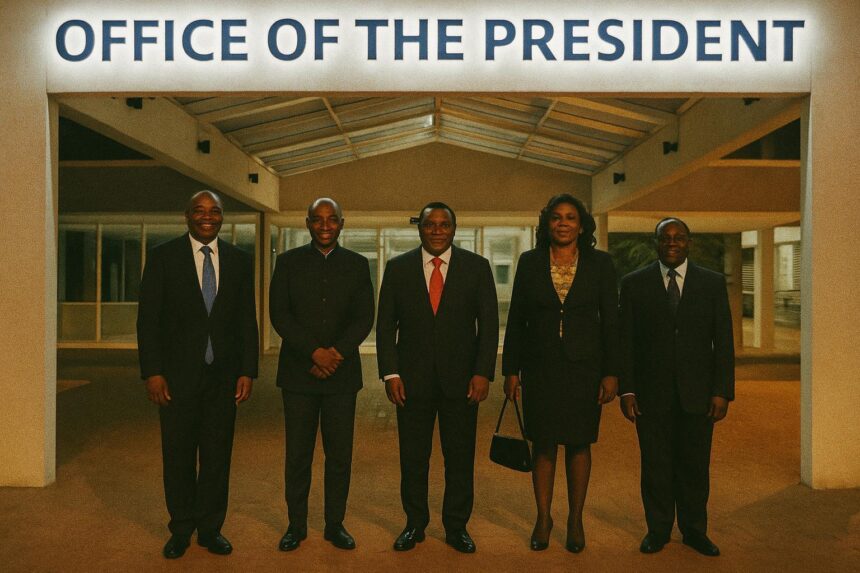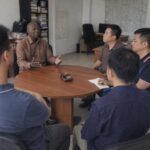Mauritian Finale of a Regional Tour
The hush of the Mauritian winter morning had barely lifted before Minister of Foreign Affairs Jean-Claude Gakosso arrived at the State House in Port-Louis. The audience granted by President Dhananjay Ramful, described by local broadcasters as “marked by cordiality”, sealed the last Southern African stop of a five-day shuttle that threaded Luanda, Windhoek and Gaborone. At each capital the Congolese envoy delivered a sealed message from President Denis Sassou Nguesso requesting alignment behind Brazzaville’s nominee, Firmin Édouard Matoko, for the forthcoming election of the UNESCO Director-General. Diplomatic observers on the island noted the symbolism: by selecting Mauritius, a multilingual hub of the Indian Ocean, Brazzaville underscored the universalist ethos UNESCO purports to defend while reminding Francophone and Anglophone blocs alike of their shared investment in cultural multilateralism.
A Candidate Rooted in Multilateralism
Matoko, a mathematician by training and seasoned multilateral practitioner, spent nearly thirty years inside UNESCO, culminating as Assistant Director-General for Africa and External Relations (UNESCO, 2024). His tenure was marked by the roll-out of the ‘Operational Strategy for Priority Africa’, a programme that channelled extra-budgetary funds toward heritage conservation in Bamako and STEM education in Harare. Supporters argue that such institutional memory positions him to navigate the organisation’s increasingly fractious funding debates, while critics point out that a long insider career may complicate reformist messaging. Brazzaville’s calculus, however, rests on a broader premise: that African ownership of global governance structures is no longer aspirational rhetoric but an attainable arithmetic.
Navigating the Subtleties of African Solidarity
Winning the 58-member Executive Board is as much about arithmetic as about atmospherics. Africa traditionally enters the UNESCO race with multiple nominees, diluting the continental vote. By embarking on what Congolese diplomats call a ‘pre-emptive consensus-building mission’, Brazzaville hopes to mitigate that historic fragmentation. Angola’s Foreign Minister Téte António, after meeting Gakosso in Luanda, praised the initiative as “a demonstration of anticipatory diplomacy” (Télangola, 22 July 2024). Yet Pretoria’s customary insistence on rotational equity and Cairo’s robust cultural diplomacy budgets suggest that unanimity remains elusive. The Congolese team thus frames its appeal in pan-African rather than sub-regional terms, emphasising Matoko’s stewardship of youth literacy projects from Dakar to Dar-es-Salaam.
Strategic Timing Ahead of the UNESCO Vote
The delicate timing of the tour has not gone unnoticed. The UNESCO electoral calendar opens the window for official nominations only in early 2025, but experience from the 2017 race—when France’s Audrey Azoulay ultimately prevailed—shows that early coalition-building can tilt the field long before ballots are cast. By locking in verbal commitments at Heads-of-State level, Brazzaville aims to render alternative African bids diplomatically costly. Analysts in Addis Ababa note that the strategy mirrors the African Union’s own praxis of designating a single candidate for multilateral posts, a mechanism that proved effective in the 2020 WHO Executive Board contest (African Union, 2023 Communiqué).
Economic and Linguistic Diplomacy Intertwined
Although the mission’s overt purpose is electoral, its subtext involves economic and linguistic stakes. By foregrounding Congo’s Francophone heritage while meeting Anglophone leaders such as Botswana’s Mokgweetsi Masisi, Minister Gakosso signalled Brazzaville’s readiness to bridge Africa’s linguistic fault lines. Port-Louis, where Creole, French and English circulate with equal fluency, provided an ideal backdrop for this message. Several memoranda of understanding on cultural industries, including a prospective co-production fund for documentary cinema, were discussed on the sidelines, according to officials privy to the talks. Such engagements underline the argument, voiced by Mauritius’ Vice-Prime Minister Leela Devi Dookun-Luchoomun, that “heritage diplomacy is inseparable from creative-economy diplomacy.”
Handing the Baton to Prime Minister Makosso
The diplomatic choreography now shifts westward. From 27 July in Libreville, Prime Minister Anatole Collinet Makosso will reprise the role played by Foreign Minister Gakosso, a division of labour designed to sustain tempo while signalling that the Matoko dossier enjoys whole-of-government backing. Stops in Abidjan, Abuja, Ouagadougou, Monrovia and Djibouti City are slated over a ten-day span. Senior Congolese advisers argue that the Prime Minister’s economic portfolio allows him to highlight the developmental dividends of UNESCO programmes, reinforcing the candidacy’s technocratic credentials. Moreover, engaging West African Economic and Monetary Union members could offset any wavering in the Southern African Development Community caucus.
Reading Brazzaville’s Broader Posture
Beyond the immediate contest, the campaign gestures toward a recalibrated Congolese diplomacy that marries soft-power projection with pragmatic coalition-crafting. By investing early political capital on the continental stage, President Sassou Nguesso positions Brazzaville as an arbiter of African consensus at a moment when geopolitical competition for the continent’s allegiance intensifies. Should Matoko secure the UNESCO helm, Congo could leverage the platform to amplify issues such as rainforest preservation, a thematic priority already championed by Brazzaville in the Congo Basin Climate Commission. Even if the bid falls short, the groundwork of intensified bilateral ties and cultural agreements may yield durable dividends. In that sense the Mauritian finale is less an end-note than an overture to a broader diplomatic score.



















